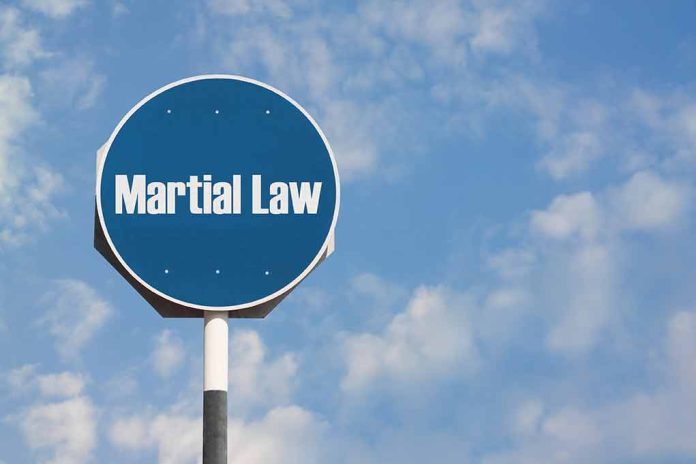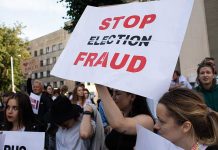
South Korea’s President Yoon Suk Yeol declares martial law, citing threats from pro-North Korean forces, sparking a constitutional crisis.
At a Glance
- President Yoon Suk Yeol declared martial law, the first such declaration in over three decades
- The declaration includes bans on political activities, media control, and industrial action
- The National Assembly quickly voted to lift the martial law declaration, deeming it “invalid”
- Protesters gathered near parliament, clashing with police and blocking military vehicles
- The situation has caused confusion and fear among South Koreans, with widespread concern on social media
President Yoon’s Dramatic Move
In a stunning development, South Korean President Yoon Suk Yeol has declared martial law, citing threats from alleged pro-North Korean forces within the country. This marks the first such declaration in South Korea in over three decades, reflecting the severe nature of the perceived internal and external threats.
The declaration includes sweeping measures such as bans on political activities, media control, and restrictions on industrial action. President Yoon’s move appears to be aimed more at domestic political opponents than at any specific threat from North Korea, raising concerns about the state of democracy in the country.
Breaking: South Korea’s President Declares Martial Law Citing Threat of Pro-North Korean Forces.
South Korea’s president declared martial law, telling his country in a televised address Tuesday night that opposition parties had made the country vulnerable to North Korean… pic.twitter.com/SHjQwdWYvf
— John Spencer (@SpencerGuard) December 3, 2024
Opposition and Public Reaction
The opposition Democratic Party, led by Lee Jae-myung, has vehemently opposed the martial law declaration, fearing potential arrests of parliamentarians. In a swift response, the National Assembly voted to lift the martial law declaration, with the Speaker declaring it “invalid.” This has created a constitutional crisis, pitting the executive branch against the legislature.
Public reaction has been intense, with protesters gathering near the parliament and blocking military vehicles. Police have clashed with demonstrators outside the National Assembly during the vote to lift the martial law declaration. The situation has caused widespread confusion and fear among South Koreans, with social media expressing significant concern about the potential for military rule and economic instability.
Breaking: South Korea's president declared martial law, saying opposition parties had made the country vulnerable to pro-North Korean forces https://t.co/HWiCdQB58g
— The Wall Street Journal (@WSJ) December 3, 2024
International Response and Historical Context
The international community is closely monitoring the situation in South Korea. The UK Foreign Office has advised British nationals in the country to avoid political demonstrations, while the US government is also keeping a watchful eye on developments.
This declaration of martial law is particularly significant given South Korea’s history. The country’s past experiences with military intervention in civilian affairs remain a sensitive issue, making President Yoon’s move all the more controversial. The last time martial law was declared in South Korea was in 1980, underscoring the gravity of the current situation.
Underlying Political Tensions
President Yoon’s declaration comes amidst declining poll ratings and scandals involving his wife and top officials. He has accused pro-North Korean forces of plotting against democracy, though he has provided no direct evidence for these claims. The President has also criticized the opposition Democratic Party for actions such as attempting to impeach top prosecutors and rejecting government budget proposals.
The situation reflects deep political divisions within South Korea, with Yoon claiming that the Democratic Party’s majority in parliament has become a threat to liberal democracy. Under the martial law declaration, activities by parliament and political parties would be banned, and media and publishers would be controlled by the martial law command.
Though the government was able to shut down Yoon’s declaration and return order to the country, South Koreans and the international community alike are watching closely to see how the fallout of this brief standoff will reverberate through the country’s democratic institutions and its relationship with North Korea.
Sources:
- https://www.the-independent.com/asia/east-asia/south-korea-martial-law-latest-news-president-north-korea-b2658047.html
- https://apnews.com/article/south-korea-martial-law-north-korea-emergency-b310df4fece42c27051f58b8951f346f
- https://www.wsj.com/world/asia/south-koreas-president-declares-martial-law-citing-threat-of-pro-north-korean-forces-a1fdc738
- https://freebeacon.com/latest-news/south-korea-president-declares-emergency-martial-law/










